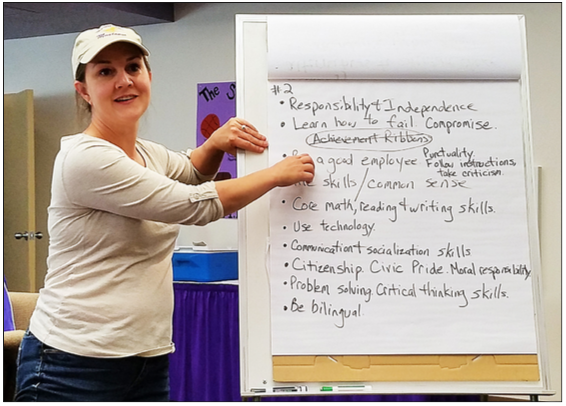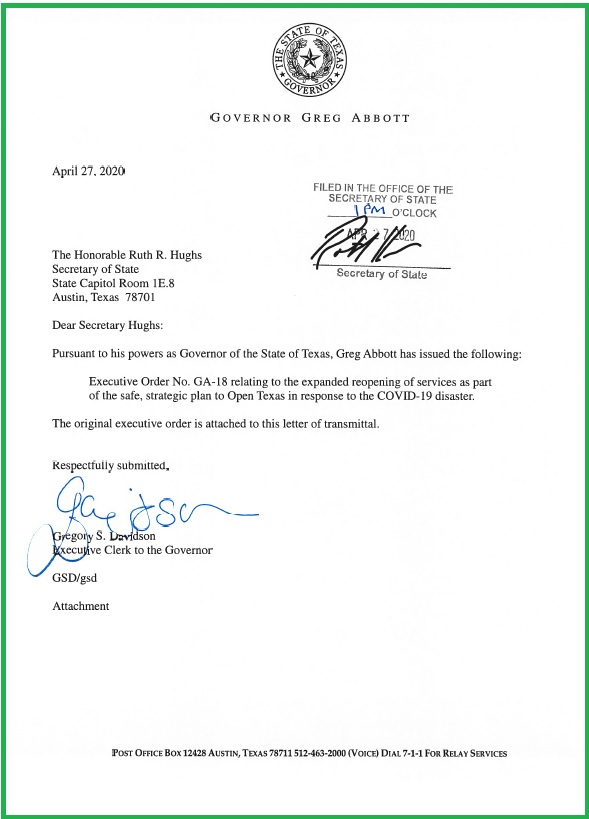Meetings Shape Our Schools

Lew Cohn/The Highlander
Mandy Mcrary goes over her group’s answers to one of three questions posed by Marble Falls ISD Superintendent Dr. Chris Allen during a Shape Our Schools meeting Saturday morning, Feb. 18.
By Lew K. Cohn
Managing Editor
The Highlander
Area residents took part in a discussion about what and how they want the Marble Falls Independent School District to do to better educate students during a Shape Our Schools meeting Saturday morning at the central district office.
The event, which was the second of four planned meetings, was also live streamed on the district's Facebook page. Acting as moderator, Superintendent Dr. Chris Allen said the object of the meeting was to make sure that “we, as a school district, are responsive to the needs of the community.”
“We are the stewards of the greatest blessings to this community, its children, as well as the blessings in the way of the taxpayers' dollars,” Allen said. “We view ourselves more as stewards than as captains of industry and this is our most important obligation to the community. We want to engage in a conversation about what you want from our schools so we can make sure we align what we do with what your expectations are.”
Allen said meetings like this, which get community input, are especially important as the district goes through “a period of unprecedented growth right now.”
Allen asked participants to brainstorm and answer three questions posed to them, from which information gleaned would be discussed.
* How has school changed since you were in high school?
Among the answers generated were the increased use of technology and how it can lead to less socialization and traditional interaction; greater school choice, including private and charter schools as well as homeschooling; more extracurricular activities; more choices for career training; learning expectations are greater; more school shootings exist and more bullying; more teaching to standardized testing; and less academic offerings that teach basic life skills.
Allen spoke to the role that technology plays in granting greater access to information to students, but noted it was a double-edged sword in that students may lack the maturity needed to handle unfettered access to large amounts of information not suited to their age or emotional development.
“It's a blessing in that, man alive, our kids have more access to information, knowledge, experiences and there are so many simulations that are out there, but on the other hand, there is some negativity that is associated with that as well,” Allen said. “The information and knowledge they have is significantly greater, which gives them a certain amount of power and autonomy, but just what we know on brain development, their emotional and mental maturity hasn't changed much.
“There is some work we can do to help with that, but there is a developmental reality that a six, seven or eight-year-old brain is still a six, seven or eight-year-old brain. At the end of the day, a kiddo is a kiddo, they are not an adult.”
He also noted that school violence and bullying has changed from the past when it used to be that students could fight and make up at the end of the day, but now bullies can be anonymous, online individuals who harass other students and create a problem that spills over into the classroom.
“In the old days, you could meet at the bike racks, fight, shake hands and be friends afterwards,” Allen said. “That's not a reality these days. In the old days, bullying was taking your lunch money. These days, there is a cyber element to it that we as public schools have to deal with whether we want to or not.
“We have some number of parents who say this is not a school matter, this took place at home, and we have some number who say you have got to make it stop. As a practical matter, I don't care where it occurs, it always bleeds over into class, so we end up needing to help assist our families of students with these issues.”
* With the backdrop that the world our students live in now was not the world we grew up in, what do students need to know and be able to do for success in life?
“Notice I did not say to get into college,” Allen said. “I want us to think pretty broadly about this. For some students that success is mapping straight into college. For some, it is mapping straight into career or the military.”
Answers given included core principles such as the golden rule; self-responsibility and accountability; civics; conflict negotiation; self-regulation and management; learning how to fail to succeed; compromise; how to be a good employee or good leader; core reading, math and writing skills; critical thinking and problem solving skills; communications skills and bilingual fluency.
“If when we were in school, one of the primary functions of instructors was to share knowledge and information with us, then because of technology, we can see that core function for teaching has significantly decreased,” Allen said. “When we talk about these skills of reading, writing and math, it is about the ability to evaluate information. What is reliable versus what is reliable. What is 'real news' versus 'fake news.' How do I get out of this pattern of allowing myself to believe everything I hear from a single source and understanding the nuance of the author's intent. It is very challenging for our students. It is not that they don't have information; they have a glut of it. The challenge is in knowing what information is useful for the work they are trying to do. It plays into these reading and writing skills. They have to be able to go a step beyond to do a deep evaluation.”
Allen said the idea of bilingual fluency is one that he believes is a priority as well.
“Education and what I do for students, we try to make it as non-political as we can,” Allen said. “Regardless of what one thinks about national languages and who should learn what, from a purely success in life, and purely economic reality, if you go in and apply for a job and you are bilingual, how does that position you versus someone who is monolingual.
“SAT scores for students who are bilingual are significantly higher. There is a brain development piece to this. I give you this challenge. When you leave here today, try to express something to someone for which you have no words.”
* What types of experiences do students need so that they can acquire the knowledge and skills for success in life?
Answers included exposure to varied professions and apprenticeships; treating students with respect; public speaking; respect; language proficiency; cultural immersion; mock elections and mock trials for civics and other practical experiences to use attained skills.
Allen talked about the idea of pathways for students towards college or a profession and how choices made early by students are not always where they end up in their career.
“We have talked about the fact it seems like students have to choose fairly early what they want to do professionally or career-wise, and yet at the same time, all of the research tells us that most people these days will have multiple careers in their lifetime,” Allen said. “So we have this real dissonance with the system connecting to the world.
“Our system is trying to give kids more authentic experiences that connect them to career pathways real early. If they see how it connects to the job, maybe they will be more interested. But regardless of which pathway they pick, they must have some basic skills, part of those core skills you talked about earlier, which will be transferrable no matter which career they pick.”
Allen noted that of the answers given by community members in attendance, very few could be measured on a standardized test like STAAR, which is a huge part of the state's incoming A-F accountability system.
“If the school is going to be responsive to our community and try to provide these types of experiences, we may need to have a followup conversation about how we as a school district are going to provide you the taxpayers the information you want so you can hold us accountable for delivering what you want,” Allen said. “The community also may have to be willing to accept the fact there might be some other accountability systems like STAAR that may not be as important to us moving on.
“I might need to hear the community say we are not as concerned about STAAR scores as long as you showing us these other things and as long as. The day may come that in order to really deliver what the community wants, we may not want to deliver what the state wants in exactly the same way the state wants it.”
The first Shape Our Schools meeting was held Jan. 18 at Spicewood Elementary School and two more events remain — one on Wednesday, March 8, at Highland Lakes Elementary School in Granite Shoals and another, Tuesday, April 25, at Marble Falls High Schools. Each of those will be held from 6 p.m. to 7 p.m.
Information obtained from the meetings will be synthesized down by a committee to determine common core values and core educational objectives for the district, which the administrative team will then determine how to best implement at Marble Falls ISD, Allen said.






